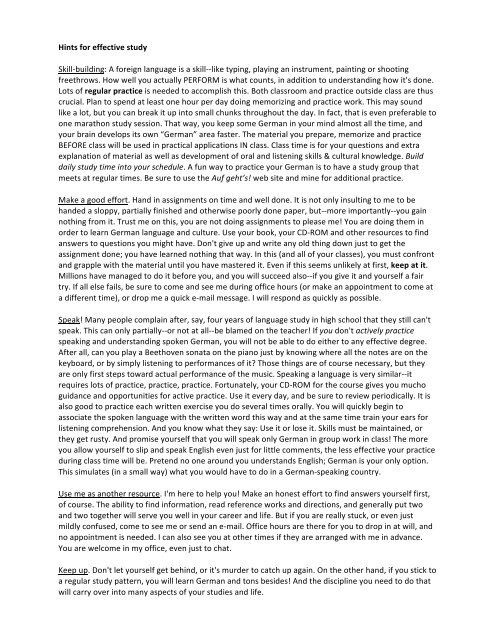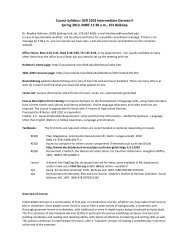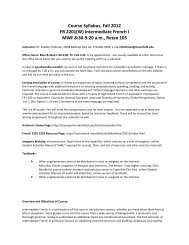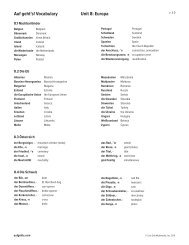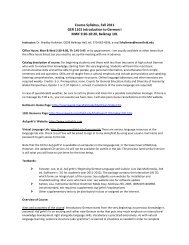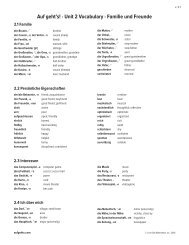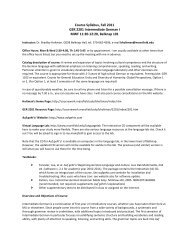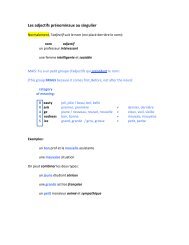Course Syllabus: GER 1102 Introduction to German II Spring 2012 ...
Course Syllabus: GER 1102 Introduction to German II Spring 2012 ...
Course Syllabus: GER 1102 Introduction to German II Spring 2012 ...
Create successful ePaper yourself
Turn your PDF publications into a flip-book with our unique Google optimized e-Paper software.
Hints for effective study Skill-‐building: A foreign language is a skill-‐-‐like typing, playing an instrument, painting or shooting freethrows. How well you actually PERFORM is what counts, in addition <strong>to</strong> understanding how it's done. Lots of regular practice is needed <strong>to</strong> accomplish this. Both classroom and practice outside class are thus crucial. Plan <strong>to</strong> spend at least one hour per day doing memorizing and practice work. This may sound like a lot, but you can break it up in<strong>to</strong> small chunks throughout the day. In fact, that is even preferable <strong>to</strong> one marathon study session. That way, you keep some <strong>German</strong> in your mind almost all the time, and your brain develops its own “<strong>German</strong>” area faster. The material you prepare, memorize and practice BEFORE class will be used in practical applications IN class. Class time is for your questions and extra explanation of material as well as development of oral and listening skills & cultural knowledge. Build daily study time in<strong>to</strong> your schedule. A fun way <strong>to</strong> practice your <strong>German</strong> is <strong>to</strong> have a study group that meets at regular times. Be sure <strong>to</strong> use the Auf geht’s! web site and mine for additional practice. Make a good effort. Hand in assignments on time and well done. It is not only insulting <strong>to</strong> me <strong>to</strong> be handed a sloppy, partially finished and otherwise poorly done paper, but-‐-‐more importantly-‐-‐you gain nothing from it. Trust me on this, you are not doing assignments <strong>to</strong> please me! You are doing them in order <strong>to</strong> learn <strong>German</strong> language and culture. Use your book, your CD-‐ROM and other resources <strong>to</strong> find answers <strong>to</strong> questions you might have. Don't give up and write any old thing down just <strong>to</strong> get the assignment done; you have learned nothing that way. In this (and all of your classes), you must confront and grapple with the material until you have mastered it. Even if this seems unlikely at first, keep at it. Millions have managed <strong>to</strong> do it before you, and you will succeed also-‐-‐if you give it and yourself a fair try. If all else fails, be sure <strong>to</strong> come and see me during office hours (or make an appointment <strong>to</strong> come at a different time), or drop me a quick e-‐mail message. I will respond as quickly as possible. Speak! Many people complain after, say, four years of language study in high school that they still can't speak. This can only partially-‐-‐or not at all-‐-‐be blamed on the teacher! If you don't actively practice speaking and understanding spoken <strong>German</strong>, you will not be able <strong>to</strong> do either <strong>to</strong> any effective degree. After all, can you play a Beethoven sonata on the piano just by knowing where all the notes are on the keyboard, or by simply listening <strong>to</strong> performances of it? Those things are of course necessary, but they are only first steps <strong>to</strong>ward actual performance of the music. Speaking a language is very similar-‐-‐it requires lots of practice, practice, practice. Fortunately, your CD-‐ROM for the course gives you mucho guidance and opportunities for active practice. Use it every day, and be sure <strong>to</strong> review periodically. It is also good <strong>to</strong> practice each written exercise you do several times orally. You will quickly begin <strong>to</strong> associate the spoken language with the written word this way and at the same time train your ears for listening comprehension. And you know what they say: Use it or lose it. Skills must be maintained, or they get rusty. And promise yourself that you will speak only <strong>German</strong> in group work in class! The more you allow yourself <strong>to</strong> slip and speak English even just for little comments, the less effective your practice during class time will be. Pretend no one around you understands English; <strong>German</strong> is your only option. This simulates (in a small way) what you would have <strong>to</strong> do in a <strong>German</strong>-‐speaking country. Use me as another resource. I'm here <strong>to</strong> help you! Make an honest effort <strong>to</strong> find answers yourself first, of course. The ability <strong>to</strong> find information, read reference works and directions, and generally put two and two <strong>to</strong>gether will serve you well in your career and life. But if you are really stuck, or even just mildly confused, come <strong>to</strong> see me or send an e-‐mail. Office hours are there for you <strong>to</strong> drop in at will, and no appointment is needed. I can also see you at other times if they are arranged with me in advance. You are welcome in my office, even just <strong>to</strong> chat. Keep up. Don't let yourself get behind, or it's murder <strong>to</strong> catch up again. On the other hand, if you stick <strong>to</strong> a regular study pattern, you will learn <strong>German</strong> and <strong>to</strong>ns besides! And the discipline you need <strong>to</strong> do that will carry over in<strong>to</strong> many aspects of your studies and life.


